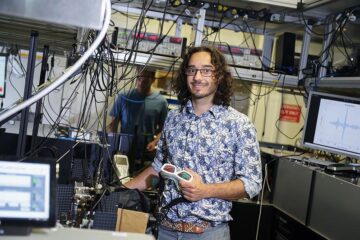Nucleic Fluorescent Probes for the Specific Detection of Single Base Alterations

</a><strong>Technology</strong><br>The present invention relates to forced intercalation probes (FIT-probes) based on nucleoside analogues with fluorescent artificial nucleobases. Thereby the nucleoside analogue is incorporated into DNA or RNA in the place of a single native base.<br>As such, FIT-probes may be employed in a large number of applications including genetic diagnostics, disease predisposition, pharmacogenetics and pathogen detection. The FIT-probes exhibit a simplistic mode of action and are able to detect single base alteration. They further possess few design constraints and show melting peak data which can be interpreted easily. The assay has been demonstrated to function efficiently directly from samples without prior purification of nucleic acids making the probe technology suitable for point-of-care diagnostics.</p>
<p><strong>Benefits</strong> <ul> <li>More specific and sensitive than common PNA probes</li> <li>First time manufacturing of DNA probes</li> <li>Abdication of linker enhances dye properties</li> <li>Enhanced sensitivity as probes differ between correct and incorrect hybridization</li> <li>Application at room temperature</li> <li>Wide range of application</li> <li>DNA probes allow detection in living cells by Fluorescence in situ hybridization (FISH)</li> <li>Enzyme activity is not influenced</li> <li>Inexpensive production</li> </ul> <p><strong>IP Rights</strong><br> EP Patent Application filed 09/2009<br> US Application filed 03/2012 <br> <br> <strong>Patent Owner</strong><br> Humboldt-Universität zu Berlin<br> </p>
Weitere Informationen: PDF
ipal GmbH
Tel.: +49 (0)30/2125-4820
Ansprechpartner
Dr. Dirk Dantz
Media Contact
Alle Nachrichten aus der Kategorie: Technologieangebote
Neueste Beiträge

Neue universelle lichtbasierte Technik zur Kontrolle der Talpolarisation
Ein internationales Forscherteam berichtet in Nature über eine neue Methode, mit der zum ersten Mal die Talpolarisation in zentrosymmetrischen Bulk-Materialien auf eine nicht materialspezifische Weise erreicht wird. Diese „universelle Technik“…

Tumorzellen hebeln das Immunsystem früh aus
Neu entdeckter Mechanismus könnte Krebs-Immuntherapien deutlich verbessern. Tumore verhindern aktiv, dass sich Immunantworten durch sogenannte zytotoxische T-Zellen bilden, die den Krebs bekämpfen könnten. Wie das genau geschieht, beschreiben jetzt erstmals…

Immunzellen in den Startlöchern: „Allzeit bereit“ ist harte Arbeit
Wenn Krankheitserreger in den Körper eindringen, muss das Immunsystem sofort reagieren und eine Infektion verhindern oder eindämmen. Doch wie halten sich unsere Abwehrzellen bereit, wenn kein Angreifer in Sicht ist?…

















